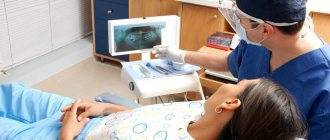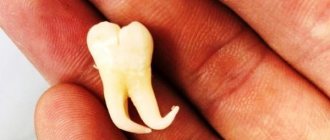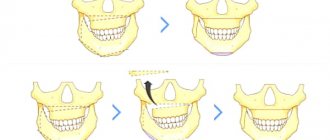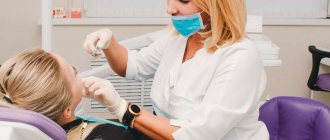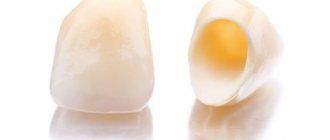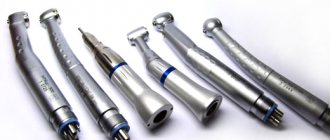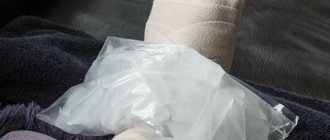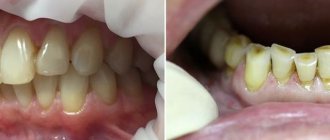In what cases should I contact
As planned
A visit to a dental surgeon is mandatory for children from 1 to 3 years old. During this time, it is necessary to carry out from one to several examinations by a specialist in this profile. The doctor should first examine the child at 1 year of age. By this age, approximately 8 baby teeth have already grown, the rest are in the process of erupting. The doctor checks them for the presence of caries, inflammatory diseases, assesses the sensitivity of the enamel, and checks their correct location. At this time, bite pathologies can be detected in time.
Routine examinations are also indicated for patients with neoplasms in the maxillofacial area, as well as for persons who have previously undergone surgery. In this case, the doctor observes the pathology for progression or degeneration when it comes to benign tumors, fistulas, keloid scars, etc.
Unscheduled
Unscheduled assistance from a dental surgeon may be needed in many cases. It is necessary for a number of diseases and medical problems. Here is a list of the main ones:
- Removal of teeth and administration of anesthesia . A dental surgeon can remove damaged and diseased teeth, as well as administer anesthesia (infiltration and conduction).
- Placement of dental implants . A dental surgeon can help with dental implants. He works on bone reconstruction in the areas where implants will be placed. If necessary or desired by the patient, the dental surgeon can also modify the gum tissue around the implants to create a more natural and attractive appearance.
- Treatment of facial injuries . Dental surgeons can treat small and complex lacerations on the face, restore broken jaws and facial bones, and nerve endings. Their expertise includes facial injuries that involve the tissues of the mouth, jaw, cheeks, nose, eye sockets and forehead.
- Assessment of pathological conditions . Oral surgeons treat patients with benign cysts and tumors of the mouth and face, malignant neoplasms, and severe infections of the mouth, salivary glands, jaws and neck.
- Elimination of pain syndrome . A dental surgeon can diagnose and treat facial pain that is caused by temporomandibular joint (TMJ) problems.
- Reconstructive and cosmetic surgery . A dental surgeon can correct problems with the jaw, facial bone and soft tissues of the face that have arisen as a result of injury or removal of tumors. Such corrective surgeries restore the shape and function of the maxillofacial area.
- Correction of birth defects . Oral surgeons also surgically correct congenital defects of the face and skull, such as cleft lip or cleft palate.
Anomalies of the dental system
Where the orthodontist with his braces, plates, trainers and aligners is powerless, a dental surgeon comes to the rescue and corrects the proportions of the jaw through surgical intervention. But after this procedure, do not forget about the long period of rehabilitation and the fact that, most likely, you will have to finish what you started by wearing the same braces or other orthodontic devices in order to become truly healthy. After all, an incorrect bite brings, in addition to aesthetic inconveniences, a lot of other problems: dental diseases, diseases of the gastrointestinal tract, headaches, and can even provoke cancerous tumors as a result of constant trauma to the mucous membrane.
Scheme for correcting malocclusion surgically
What diseases does it treat?
Among the main diseases treated by a dental surgeon:
- periodontitis;
- diseases of the TMJ (temporomandibular joint);
- periostitis;
- osteomyelitis;
- tumors and cysts of the oral cavity;
- diseases of the salivary glands;
- sinusitis;
- abscesses;
- trigeminal nerve diseases;
- phlegmon and others.
A doctor of this profile also diagnoses some specific systemic diseases that manifest themselves in the oral cavity. Among them: syphilis, actinomycosis, scurvy, tuberculosis, etc. For such diseases, treatment is prescribed to the patient by another doctor (infectious disease specialist, virologist, pulmonologist).
Preparing for your appointment
Before going to the dentist, you need to have a hearty snack - after surgical procedures, you should not eat food for several hours. On the eve of the visit, drinking alcohol is contraindicated - it can negatively affect the effect of anesthetics (painkillers will not work). Immediately before visiting a doctor, you need to perform thorough oral hygiene.
Patients who have encountered acute infectious diseases of the ENT organs, rashes in the oral cavity, or herpes on the lips should avoid visiting a specialist. Women are not recommended to undergo surgical procedures on menstruation days, since at this time the body is in a weakened state.
You must bring your medical history, reports from previous examinations, and all x-rays (if available) with you to your appointment.
Work with children
Performing operations on younger patients is a complex undertaking. The psychological aspect is of paramount importance.
The child is afraid of any intervention, especially in the dentist’s office. It is important for the specialist to gain the trust of the little patient and carry out the procedure with the least discomfort.
For this purpose, special attention is paid to the choice of medications and selection of anesthesia. It is important to consider the possibility of allergic reactions and drug intolerance. Anesthesia should be used in a minimum concentration for a short period of time.
If possible, administering anesthesia by injection should be avoided.
The doctor must take into account that the tissues are just being formed and their constant and not always uniform growth occurs, therefore the introduced elements must be installed taking into account the development of the oral organs.
How is the appointment going?
Like any other specialist, a dental surgeon first of all listens to patients’ complaints and collects anamnesis. He must know everything related to the problem that worries the patient. Then it’s time for a visual inspection. The doctor examines the problem area, and he can use tools such as a dental mirror, spatula, probe and others.
Using light tapping, the doctor identifies the area that is causing pain. If we are talking about soft tissues, palpation is performed. The doctor pays attention to swelling, redness, altered areas of the skin and mucous membranes, as well as the patient’s appearance. How the examination will be carried out directly depends on the specific case.
Comments
My mother lost a tooth and more than once she visited a dental surgeon who recommended installing an implant. She does not dare to undergo this operation. He says that when installing an implant there are risks: rejection, complications. Is this true and what to do in this case?
Maria (06/15/2018 at 05:56) Reply to comment
A couple of years ago, a paid dental surgeon successfully removed the upper eight, warning me before the manipulation that a through hole could form into the nasal cavity. He said that if this happens, it will have to be stitched up in the surgery department at the general hospital. But, fortunately, everything worked out. There is another 8 in the pipeline in the future. Please tell me if there are any dental clinics where fistulas are sutured on the spot. And does the dental surgeon directly do this immediately after wisdom tooth removal?
Tatyana (06/15/2018 at 06:58) Reply to comment
The photos in the article are frankly terrifying. Does a dental surgeon work together with an anesthesiologist? I can't believe that people can endure all these surgical procedures under local anesthetic.
Olesya (06/15/2018 at 07:38) Reply to comment
And I just lost my wisdom tooth, which could not crawl out from under the gum hood on its own. I pulled and pulled until the dental surgeon removed this pocket completely with a laser - quickly and cheaply! The tooth was then treated for “white” caries. But I’m wondering: at what stage of wisdom tooth eruption should I contact a dental surgeon in order to prevent the development of caries under the mucosa? At what stage does a tooth begin to rot?
Katya (06/15/2018 at 07:47) Reply to comment
A few months ago I needed to remove the eight. I was terribly afraid, I had read a lot of cases where a tooth breaks off, fragments remain, and then rotting and infection begin. But I was lucky with the surgeon - he removed the tooth in 5 minutes and without complications at all.
Christina (06/18/2018 at 09:55) Reply to comment
A dental surgeon must also be a psychologist and be able to properly “tune” the patient so that he is not afraid. I wonder if in medical schools they teach dentists psychology or some techniques for communicating with patients?
Marina (06/18/2018 at 10:18 am) Reply to comment
There are many times when you need the help of a dental surgeon, most often during tooth extraction, of course. But for more serious operations, do they administer anesthesia themselves or is there a separate doctor for this?
Anita (06/18/2018 at 10:33 am) Reply to comment
After the tooth was removed, a piece of the root remained in the gum. I can really feel it on my tongue! The gums are swollen and swollen. The dentist who removed the tooth said that I needed to see a surgeon to cut the gum. What anesthesia will be used in my case? Another problem, I'm breastfeeding. Is it possible to use anesthesia for this?
Alina (06/18/2018 at 10:35) Reply to comment
If the wisdom tooth is positioned correctly, has grown normally and does not cause any trouble, then does it need to be removed? I just know that now most people remove wisdom teeth without any indication, considering them harmful in advance.
Inna (06.27.2018 at 14:12) Reply to comment
I was really upset: if in the clinic where I had my tooth removed (I had a cyst), I had been seen by a dental surgeon from the very beginning, then maybe through partial removal, as in the second example, the tooth would have been saved... I read about implantation and thought: Is it worth asking for a consultation with a dental surgeon before installing not an implant, but crowns - a fixed bridge? Or is this the prerogative of the orthodontist?
Irina (06/27/2018 at 15:39) Reply to comment
I am glad that dental surgeons are trained well, but for some reason I am terribly afraid of them. I went in as an adult only once to have a figure eight removed; on the whole it was not painful, but scary. Has anyone had figure eights removed under general anesthesia? I just read on the Internet that there is such a practice.
Nina (06/27/2018 at 16:16) Reply to comment
Write your comment Cancel reply
Diagnostic methods
In surgical dentistry, instrumental and laboratory diagnostic methods are used. These include:
- taking anamnesis;
- visual and manual inspection;
- temperature diagnostics;
- X-ray examination (x-ray and orthopantomogram);
- electroodontic diagnostics;
- general blood test, etc.
If oncological processes are suspected, the patient is prescribed a biopsy and a series of cytological studies. With their help, you can determine the type of neoplasm, as well as confirm or refute its benignity.
If there are concomitant diseases that are not within the competence of the dental surgeon, the patient may need the help of other specialists. In particular:
- orthodontist;
- orthopedist;
- gastroenterologist;
- oncologist;
- infectious disease specialist;
- allergist, etc.
Stock
-27%
Teeth in 1 day on Straumann implants using ProArch technology!
300,000 rub. 220,000 rub.
get -25 %
Removable denture for 1 jaw 40,000 rub.
30,000 rub.
get -17 %
Quadrotti dentures (without palate) 60,000 rub.
50,000 rub.
get -22 %
New tooth in 1 day - implant and prosthesis immediately!
45000 rub. 35,000 rub. get
Treatment methods
Surgical dentistry provides a wide range of treatments, which include special methods of surgical influence on the tissues of the oral cavity. The specific choice of treatment method depends on the disease. This section of dentistry practices the following treatment methods:
- bone grafting;
- tooth extraction operations;
- aesthetic surgical operations;
- implantation;
- prosthetics;
- resection of soft tissues.
After surgery, anti-inflammatory, antihistamine, antiprotozoal and antibacterial drugs may be prescribed. If pain is present, anesthetics are indicated.
Who is a dentist surgeon
A dental surgeon is a specialist who graduated from a higher medical school and completed residency in the specialty “Surgical Dentistry”. This is a doctor who not only removes teeth, he performs complex maxillofacial surgeries that eliminate serious problems in the oral cavity, aimed at eliminating defects and preserving the integrity of the dentition.
By the nature of his work, the surgeon is in close contact with dentists of other specialties: prosthetist, implantologist, therapist, hygienist, etc. By performing their job duties, surgical doctors daily improve the quality of life of patients scheduled for scheduled operations. In addition, they provide necessary treatment in emergency situations.

